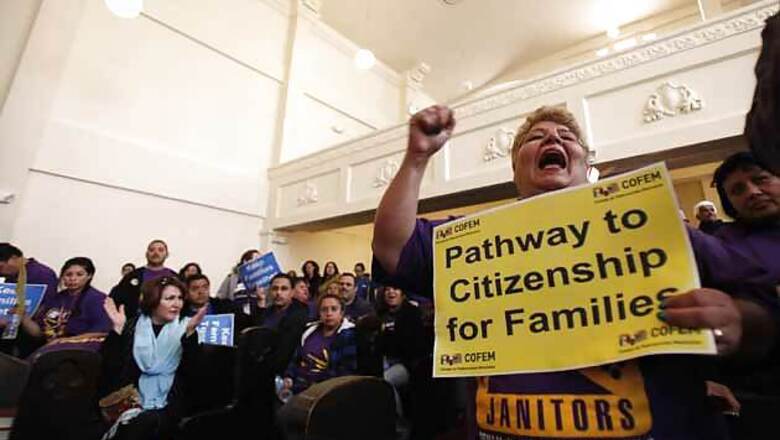
views
Washington: The Republican-controlled House of Representatives will bow to political pressure and pass the immigration bill approved by the Democratic-led Senate by the end of the year, Democratic Senator Charles Schumer predicted on Sunday.
Schumer, a member of the bipartisan Senate group that crafted the immigration measure, said House Republicans who are now vowing they will not pass the Senate measure will ultimately be convinced by political concerns about the party's future.
"I believe that by the end of this year, the House will pass the Senate bill. I know that's not what they think now. And they'll say, 'Oh no, that's not what's going to happen.' But I think it will," Schumer told the "Fox News Sunday" programme.
Senior House Republicans rejected Schumer's prediction. Republican Speaker John Boehner has said the House will write its own immigration bill rather than bringing up the Senate bill passed on Thursday, which is supported by Democratic President Barack Obama.
Fourteen Senate Republicans joined Senate Democrats in backing a Senate bill that features a path to citizenship for millions of illegal immigrants already in the United States, an approach vehemently opposed by many conservative House Republicans who view it as rewarding law-breakers.
Some Republican leaders worry that rejecting the Senate bill could further alienate Hispanics, a fast-growing bloc of voters who overwhelmingly supported Obama's re-election in 2012, and could handicap the party in future presidential elections.
Schumer said House Republicans eventually will allow a vote on the Senate bill to get the issue off their backs and ease the pressure from immigration reform supporters including religious, civil rights and business groups.
"Within several months, Speaker Boehner will find two choices: no bill or let a bill pass with a majority of Democratic votes and some Chamber of Commerce-type Republicans. And he'll find that the better choice," the New York senator said.
House Republicans sarcastically shrugged off Schumer's prediction.
"I was moved almost to the point of tears by Senator Schumer's concern for the future prospects of the Republican Party. But we're going to not take his advice," said Republican Representative Trey Gowdy of South Carolina, who heads the immigration subcommittee of the House Judiciary Committee.
"The Senate bill is not going to pass in the House, and it's not going to pass for myriad reasons," Gowdy said.
"I'm more interested in getting it right than doing it on Senator Schumer's schedule," he added.
FUTURE IMPLICATIONS
Boehner has said an immigration bill will be put to a vote only if a majority of House Republicans back it. Boehner supports a piecemeal approach using smaller, targeted bills rather than the sweeping Senate legislation.
Republican Senator John McCain of Arizona, another member of the bipartisan group behind the Senate bill, said it would not be easy to convince the House to pass broad immigration reform but held out hope.
"I really hesitate to tell Speaker Boehner exactly how he should do this. But I think Republicans realize the implications (for) the future of the Republican Party in America if we don't get this issue behind us," McCain said on "Fox News Sunday."
"I believe that the coalition that we've assembled of support ranging from evangelicals, to the Catholic church, business, labor, farm workers, growers ... I frankly have never seen such widespread support. And I am hopeful that we can convince our House colleagues," McCain said.
Representative Nancy Pelosi of California, the top Democrat in the House, said she was optimistic the political realities of immigration would force House Republicans to come around.
"It's certainly right for the Republicans if they ever want to win a presidential race," Pelosi said on NBC's "Meet the Press" program.
A proposal being talked about in the House as an alternative to the Senate bill would offer possible citizenship in the future after illegal immigrants spend a decade working through a legalized status that gives them work permits.
Representative Robert Goodlatte of Virginia, chairman of the House Judiciary Committee, said it was possible the House could pass a measure that did not include a pathway to citizenship but focused on a "pathway to legalization" for undocumented immigrants. On ABC's "This Week" program, Goodlatte also made clear the House would not pass the Senate bill.
"When you use the word pathway to 'legalization' as opposed to pathway to 'citizenship,' I'd say, 'Yes,'" he said when asked about the chances for an immigration bill getting through the House.
"Not a special pathway to citizenship where people who are here unlawfully get something that people who have worked for decades to immigrate lawfully do not have," Goodlatte added.




















Comments
0 comment